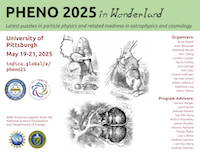Speakers
Description
Primordial black holes remain compelling candidates for dark matter and could produce detectable high-energy neutrino fluxes through Hawking radiation. We extend beyond previous analytical frameworks by implementing a comprehensive examination of various black hole mass distribution models and their corresponding neutrino emission characteristics. Through detailed simulations of detector response, we derive projected exclusion contours in both the mass-abundance $(M-f_{\text{PBH}})$ parameter space using IceCube and project future discovery potential for the IceCube-Gen2 configuration. Additionally, we map these constraints onto the neutrino flavor triangle, providing insight into how flavor composition measurements can further constrain PBH properties. Our multi-dimensional approach demonstrates improved constraints compared to previous analyses, potentially advancing our understanding of these primordial relics and their neutrino signatures.

